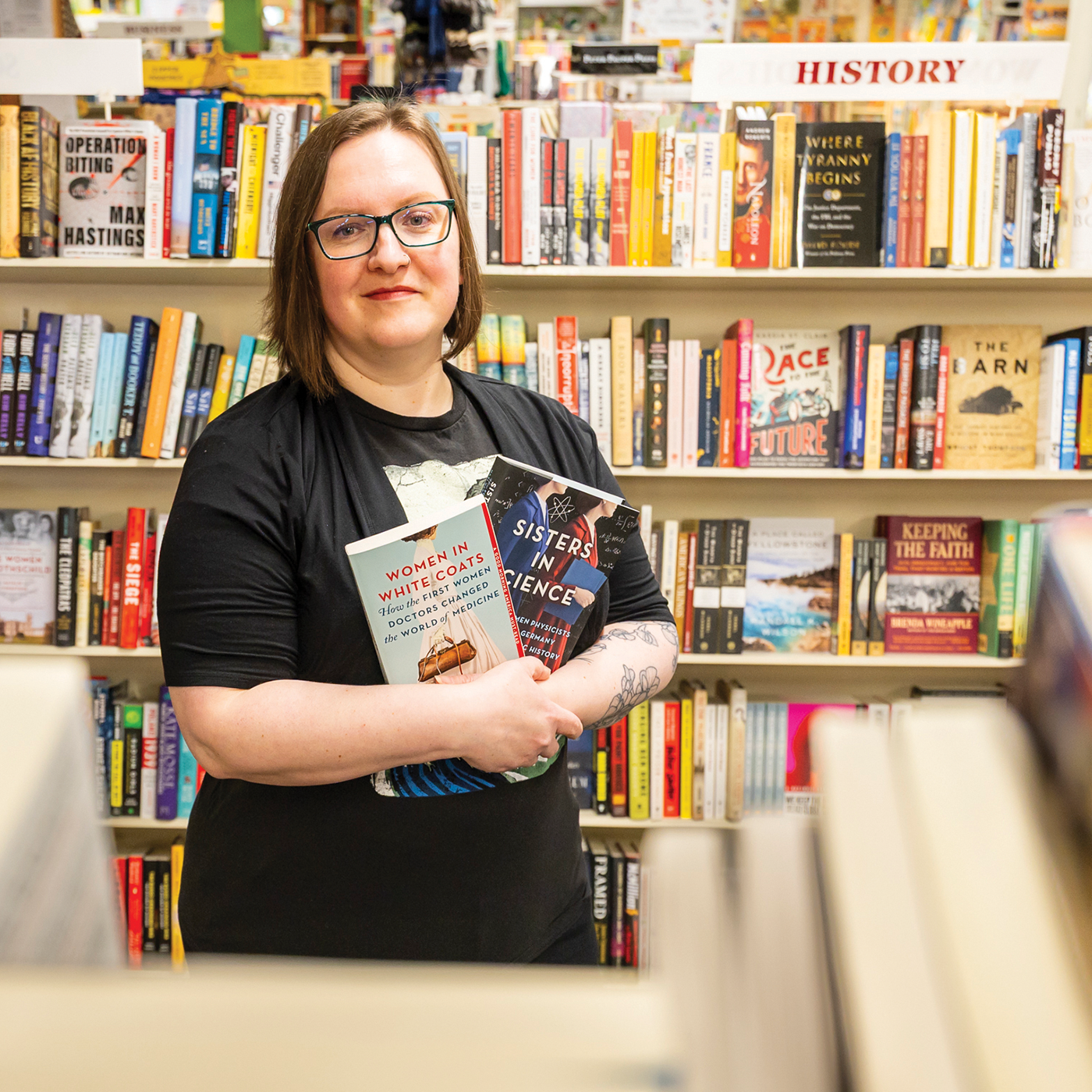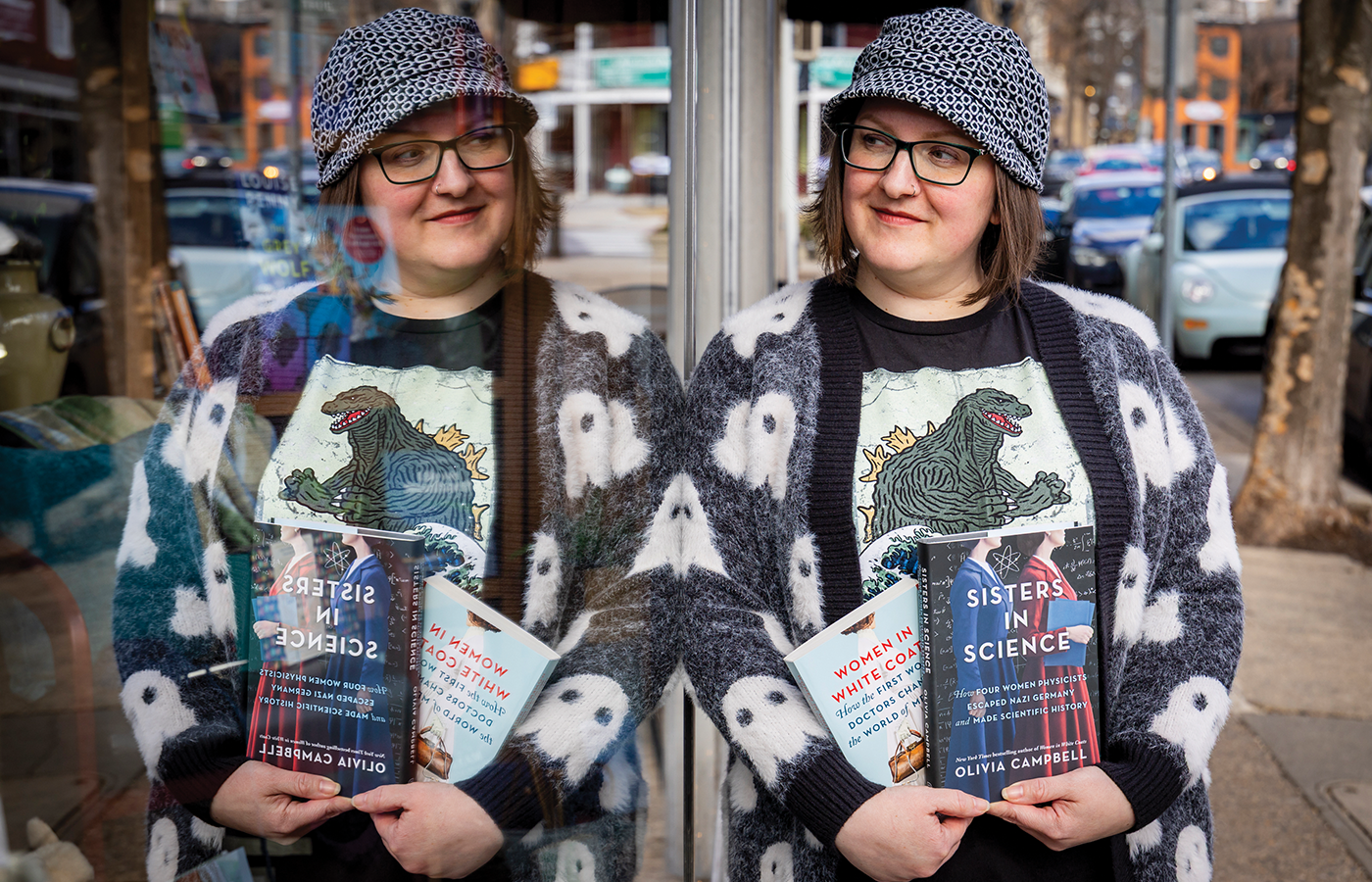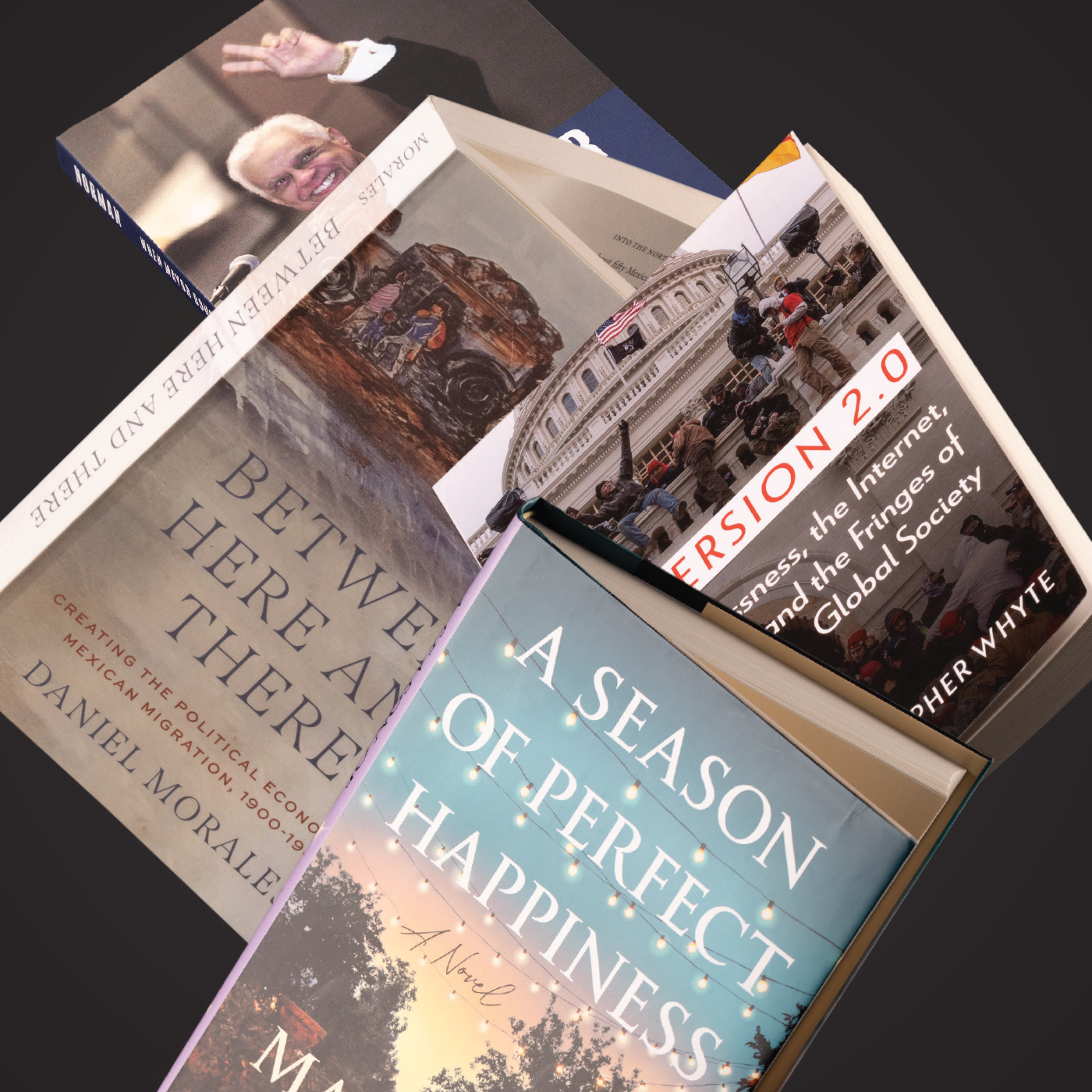
Books
A wrinkle in the timeline
Olivia Campbell (B.S.’07) meant to be a dancer, but fate got in the way. Now she’s a science journalist and bestselling author. Her second book, “Sisters in Science,” came out last year.
In a parallel timeline, author Olivia Campbell (B.S.’07) became a ballerina/arts journalist, making a career of being on point in two fields. In our timeline, though, she broke her right foot and had a baby before she got to decide what she really wanted to be when she grew up.
“In my last year of college at VCU, I got pregnant,” says Campbell, a dance major-turned-journalism major-turned-freelance science journalist whose new book “Sisters in Science: How Four Women Physicists Escaped Nazi Germany and Made Scientific History” came out in December. “My experience of an unplanned pregnancy, of a very difficult delivery, of postpartum depression — those experiences really totally flipped my focus in my writing. I went from writing about gallery openings and dance shows to wanting to know everything, read everything I could and write everything I could about women’s health.
“I felt totally unprepared and alone through all those experiences, and I felt like I wanted to write to help other people.”
In the late 2000s, Campbell says, editors’ interest in women’s health journalism was occasional, at best. That made being a freelance reporter, already a trying lifestyle, more annoying.
“Even today I’m pitching stories based on my books, and no one’s biting, so now I’m just putting them on my Substack newsletter,” Campbell says. “But, yeah, we’ve never really been super hungry for these stories, or at least editors aren’t. You have to make your case really strongly. You have to push and try to meet them halfway in a way that they think that people are interested in, but also to change their mind and say, ‘People will want this. People will read this.’”
One of the best things to be is right.
Eighteen years after graduating from what is now VCU’s Richard T. Robertson School of Communication, Campbell, still a regular contributor at National Geographic, is a bestselling author of two pop-history books about women in science, written in what Campbell acknowledges is a jarringly nontraditional style, referring to the books’ protagonists by their first names and going full Greek chorus about the action on the page, among other quirks.
“I hope that it’s not stuffy and detached. That’s what I’m trying to get away from,” Campbell says of her writing. “I read so many straight biographies and I’m just so bored — like, I don’t care about this. I feel like putting a little of my emotions, my frustration with what’s happening, in the text — trying to telegraph how you should feel about what I’m saying — kind of keeps it lively, keeps you engaged.
“There are a lot of points where I butt in and I’m like, ‘This letter is ridiculous. Can you imagine sending this letter?’” She’s referencing a 19th-century university chancellor who wrote very vigorously about his opposition to women professors. “I’m thinking of the college administrator who’s ranting and raving about how terrible it is to hire women. I had to push pretty hard to include really big quotes like that, the big chunks of letters. … I really advocated for those points where I was like, I need you to know how I’m feeling and how frustrated or how inspired I am, how impressed. These women were incredible, and I hope that it shows. Maybe it’s a bit too much of me in there. I don’t know. But I like to think it’s enlivening.”
Campbell’s first book, “Women in White Coats: How the First Women Doctors Changed the World of Medicine,” is a New York Times Best Seller that sprang from her freelance journalism. Released in 2021 by Park Row Books, a HarperCollins imprint, it tells the stories of Elizabeth Blackwell, Elizabeth Garrett Anderson and Sophia Jex-Blake, who became medical doctors in Victorian times, despite the day’s antipathy toward such a thing.
Campbell’s new book, “Sisters in Science,” follows Hedwig Kohn, Lise Meitner, Hertha Sponer and Hildegard Stücken on their odysseys to become working physicists as the Third Reich took over Germany.
While not directly about women’s health, the subject of “Sisters in Science” sits flush in Campbell’s purview and is fidelitous to her influences. She grew up in Harrisonburg, Virginia, reading Nancy Drew novels and dorking out on “The X Files” and “Star Trek: The Next Generation” TV shows.
In the fifth or sixth grade, Campbell wrote a fan fiction script for an episode of “TNG,” and to her continuing disbelief, the teacher let her conscript a cast from her classmates and perform it. Campbell doesn’t remember the thrust of the episode, but if our timeline has any elegance at all, it centered on Dr. Crusher.
“I wrote a lot about fertility and infertility drugs,” says Campbell, recalling her early freelance journalism career when she wrote for Slate, Pacific Standard and Brainchild Magazine, among others. “I’ve written about maternity-care deserts. I’m writing about racial disparities in women’s health care and maternity care, all these things. I was freelancing for many, many years, and that was the core of what I did — very broad topics within science and women’s health, social science and culture.”

Campbell says she wants to keep writing books about women in science and the people she finds in history’s shadows. “I lie in bed at night thinking about that,” she says. “Where could our culture be, where could our society be, if we hadn’t lost all these voices?”
Aspiring authors might want to gird themselves for this next part. Campbell’s first book came about after some agents got dreamy-eyed over an article she wrote for the website Literary Hub in 2017. The piece was part environmental journalism, part cultural history. Campbell wrote about climate change in the Black Forest, that big German mountain range, deli ham namesake and frequent fairy tale setting.
“I was thinking about how our landscapes create stories — we use landscapes to spark stories, right?” Campbell says. “And then, how will climate change affect those landscapes? How will these stories change as these landscapes change? So that publication prompted several agents to come to me and say, ‘Hey, do you have any book ideas? This is a really cool story. We like how you think. Would you like to write a book?’
“It was sort of a backwards way into book writing. I know — I feel guilty because people have these book proposals and write a novel and they have it sitting there for years and years and they’re pitching and pitching and nobody wants it, but I had it the other way around. I didn’t have designs on becoming a book author.”
Campbell says her third book will have to do with women in marine science in the 19th century. It’s unclear when that one will be out. She has yet to crack the plot and remains in the market for its muse.
Whenever it’s published, it won’t finish a trilogy about women in science. Campbell wants to keep writing books about them and the people she finds in history’s shadows.
“I lie in bed at night thinking about that,” she says. “Where could our culture be, where could our society be, if we hadn’t lost all these voices, all these great minds to racism, to sexism, to anti-semitism, to Islamophobia, all the isms and the intolerance — so many amazing minds — to class as well, to how our society is structured? It plagues me.
“These women [I write about] are exceptions, and they had to be above reproach. They had to act a certain way, and they knew this. They had to be thinking all the time, ‘Am I coming across as shrill? Am I coming across as flirty?’ All these calculations they’re having to constantly make to be accepted, to remain in the position they’re in, to get anywhere in the profession. [Society] could have gotten way farther and could have gone to amazing places, created amazing things, had so many people not been really highly discouraged or not allowed at all to pursue whatever career they wanted to.”
In a parallel timeline, perhaps there’s a ballerina/art journalist writing about what those people didn’t get to do in ours.

MORE BOOKS
Here’s a glance at a few other books VCU faculty and graduates are writing these days …
“When Mayor Doug Wilder Ruled Richmond: Strong-Arm Politics in Virginia's Capital City” (Brandylane Publishers, 2024)
Linwood Norman (B.S.’75, M.S.’90)
Richmond moved to a “strong mayor” system in 2005, just as former Gov. L. Douglas Wilder, a notably strong personality, took office. Mass communications grad Norman, Wilder’s City Hall press secretary, knows where the bodies are buried (figuratively!), and here, he gives readers an inside look, in a clear, engaging voice, at this tumultuous, still-controversial chapter of city history.
“Between Here and There: Creating the Political Economy of Mexican Migration, 1900-1942” (Oxford University Press, 2024)
Daniel Morales, Ph.D.
Morales, an assistant professor in VCU’s history department, traces migration patterns throughout the U.S. in the first half of the 20th century, setting the stage for the present day, with Mexico-U.S. migration as an entrenched feature in both countries. His timing is impeccable, as immigration continues to be a hot topic among voters and a policy issue that affects millions, from those currently seeking asylum to immigrants already living in the U.S.
“Subversion 2.0: Leaderlessness, the Internet, and the Fringes of Global Society” (Oxford University Press, 20204)
Christopher Whyte, Ph.D.
Whyte, an associate professor in the Wilder School’s homeland security and emergency preparedness program, explains how the leveling influence of the internet, more than any other medium, streamlines dubious ideas or even outright nuttery into acceptable topics of discussion; and that’s not only for individuals like your once-rational Uncle Bob but also at staid bastions like the mainstream media. Through this lens of “leaderlessness,” Whyte shows how this kind of speech not only spreads at warp speed but also eats away at institutions and social trust
“A Season of Perfect Happiness” (Dutton, 2024)
Maribeth Fischer (M.F.A.’90)
The third novel by creative writing graduate Fischer follows Claire, who fled her longtime Delaware home after a tragic incident to remake a confined life in small-town Wisconsin. Meeting a charismatic man and his circle of friends starts to free her from carefully erected barriers, but when someone from her past shows up, she has to face her terrible secret all over again. — Judy Arginteanu
